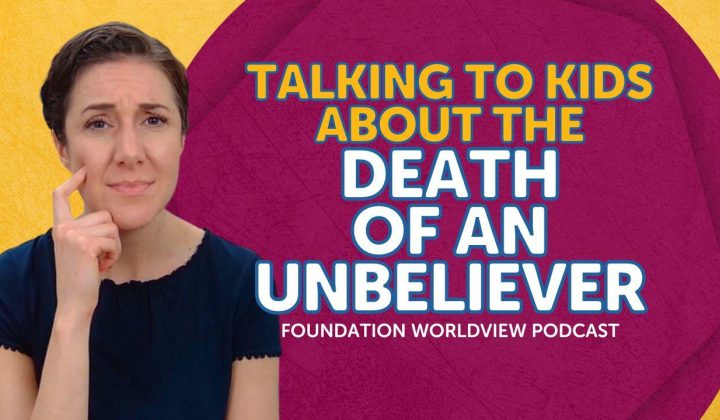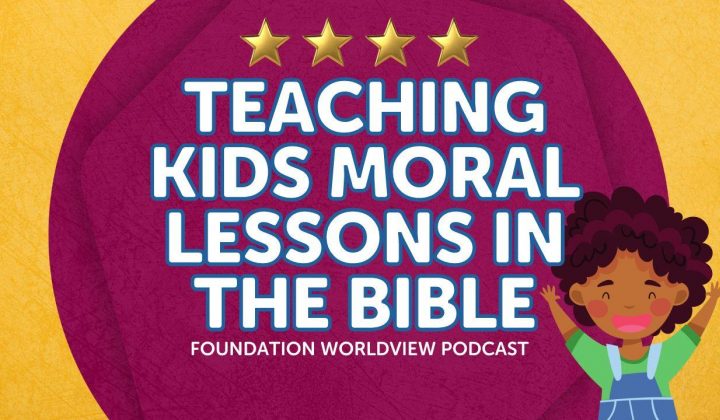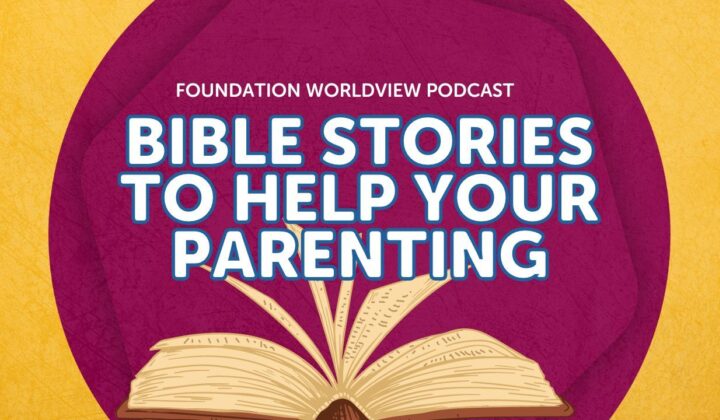Learn more about the journey that led to us equipping kids to carefully evaluate every idea they encounter.
Meet members of our team who have contributed to curriculum development.
Hear from real users of the Foundation Curriculum.
Learn what we believe about God, Jesus, Scripture, and more.
Is Gentle Parenting Biblical?
In this episode, Elizabeth Urbanowicz looks at the popular parenting style of Gentle Parenting and examines its methods through a biblical perspective.
Transcript
Note: The following is an auto-transcript of the podcast recording.
Hello friends, and welcome to another episode of the Foundation Worldview Podcast where we seek to answer your questions so that you can equip the children that God has placed in your care to carefully evaluate every idea they encounter and understand the truth of the biblical worldview. I'm your host, Elizabeth Urbanowicz, and I'm thrilled that you've joined me for another episode today. Now, today's question is short and sweet and it says, "Is Gentle Parenting biblical?" Really interesting question, and I'm sure that one that's on some people's hearts and minds because I know Gentle Parenting is a very popular style of parenting now. So we're going to dive down deep into that question today.
But before we do that, I would ask that if you found the content of this podcast beneficial that you would like and subscribe to make sure that you never miss a future episode, also ask that you would write a review to help more people find this content so that we can equip as many adults as possible to get the kids in their care to carefully evaluate every idea that they encounter.
Now, as we think about parenting style, it's important that anytime we're trying to evaluate an idea that we first define our terms and understand what that idea is. Because when someone says gentle parenting, they might mean something that is very different than the official definition. So first, what is Gentle Parenting officially? Now, according to the Cleveland Clinic, which is one of the leading pediatric and adolescent medical research centers in the us, according to them gentle parenting, it says "The goal of gentle parenting is to raise confident, independent, and happy children through empathy, respect, and understanding and setting healthy boundaries. This parenting style focuses largely on age appropriate development instead of focusing on punishment and reward, gentle parenting focuses on improving a child's self-awareness and understanding of their own behavior." Now, if you go and you just search Gentle Parenting Cleveland Clinic, you can read a whole article describing even more of what gentle parenting is.
But just in general, the goal is to raise these confident, independent, and happy children through empathy, respect, and understanding and setting boundaries. And this parenting style doesn't focus so much on punishment and reward, but helping children understand their own self-awareness and their behavior. Now we want to look what are some aspects that align with the biblical Worldview, and then are there any aspects that don't?
So when we think through, what are any aspects of this parenting style that align with the biblical worldview? One aspect that I think clearly aligns with the biblical Worldview is staying calm in parenting situations that staying calm, not flying off the handle, not responding out of anger that aligns with the biblical worldview. It aligns with treating our children as image bearers, thinking of what is genuinely best for them, not just responding out of our own emotional frustration.
Staying kind also fulfills the commandments that we've been given in the New Testament, to be kind and compassionate towards one another, to be patient with one another. So staying calm, being gentle as in staying calm. That's a way that we can align with the biblical worldview. And so that's an aspect of gentle parenting that I think does align with Scripture.
Another aspect that aligns with Scripture is helping our children understand why what they are doing is wrong, helping them understand you're not just changing your behavior because I punish you, that you're changing your behavior because I'm helping you understand your behavior. This is what God has modeled for us in Scripture, that he has told us clearly how to live. There's not some surprises with that. God has very clearly told us in his word what is right and what is wrong, and when there are specific cases where we're like, I don't know, there's no specific command in Scripture to do this or to not do this, we can look for general principles. So helping our children understand why what they're doing is wrong is biblical.
Another thing that aligns with the biblical worldview is making the focus on, sorry, putting the focus on the behavior rather than on the parent's anger. That why should our children change their behavior? Because what they were doing was objectively wrong. They shouldn't change their behavior just because I get angry. Now, if something our children does frustrates us, but it's not inherently sinful, we can ask our children to stop, but we need to make sure that they understand this is not something that's inherently wrong. There's a difference between doing something that's inherently wrong and just doing something that frustrates me. So we want to put the focus on, okay, this was a wrong behavior, not you frustrated me.
Another thing in gentle parenting that I think is biblical is the focus on relationship building. Part of gentle parenting is building a relationship between parent and child. As we've talked about in many Foundation Worldview Podcasts in the past, the gospel is all about relationship. God's grand story is all about relationship, first of all, because God himself is relational, that God the Father, God the Son, and God the Holy Spirit, have been in perfect loving fellowship from eternity past into eternity, future. And as God's image bearers, he has designed us for relationship. The only thing that was not functionally good in God's creation was the fact that Adam was alone, that he did not have a helper with which he could fulfill God's command to be fruitful and multiply, to fill the earth and subdue it. So God has created us for relationship with him, which ultimately fulfills us, and then for relationship with one another so that we can fulfill these commands that God has given us.
And then we know that the gospel is all about reconciling the relationship that was broken between us and God, us and one another, even us and ourselves when Adam and Eve rebelled against God. So making the focus of our parenting on building healthy relationships with our children is a biblical thing. So there are these aspects of gentle parenting that align with Scripture.
Now, next, we need to ask ourselves, are there areas of gentle parenting that do not align with the biblical worldview that do not align with Scripture? Now, one thing that I think is very clear in gentle parenting as you dive down deeper into what it is that I think is very clearly not biblical, is one thing that is recommended is that when you're talking to a child about his or her behavior, you explain how that behavior makes you feel.
Now, this is something that I was taught in my classroom discipline and management class at college, even at a Christian college that they called it I statements that you were supposed to say, "I feel hurt when you talk during math class," that we were supposed to let the student know how we felt because of their behavior.
And that's what gentle parenting teaches, that you're supposed to use these I statements. "I feel sad when you don't get your shoes on time so that we can make it to school on time." Now, I would say that this is not biblical because the reason that our children need to change their behavior is not because of how it makes us feel, but because of the inherent sinfulness of their actions. If we tell our children to get their shoes on and they don't get their shoes on, they have disobeyed us. And God has called children to obey their parents if we're telling them to get their shoes on because we're going to be late for school, being late for something is not respecting and valuing someone else because we're saying, "oh, you know what? Your time doesn't matter to me. I'm just going to think about myself."
So we need to help our children see how their behavior is sinful. We need to ground it in the objectively wrong action that they have done. This was objectively wrong, not this is how this action subjectively made me feel. Because if we ground it in how we feel, we are just teaching our children to be people pleasers and we're not teaching them about objective morality.
Another area of gentle parenting that I do not think aligns with Scripture is viewing ourselves as our children's coach, that this is another aspect of general parenting, that the parent is the coach, their coaching the child in how they should live. Now, the role of parent is unique. It's a unique role that has been given to us by God, and it should be viewed biblically. What does God say about our role as parents? We are not our child's coach. Our primary goal as parents is to make disciples that that's the command that's been given to us in Matthew 28 that was marching orders to us when he ascended into heaven in Matthew 28, that we are to go and make disciples. Now we're to make disciples in all the world. We're to preach the gospel in all the world and for parents, parents' primary area in which they are to preach the gospel and make disciples is with their children. So we are not our child's coach, okay? We're not there to give them a pat in the back and at pep talk, we are to be their parents, to exercise our God-given authority over them within the bounds of Scripture that God has given us, and to make disciples. That should be our ultimate goal to make disciples.
Another area in which I think gentle parenting really misses the mark biblically, is one thing that is recommended in gentle parenting is seeking to have everyone who's in authority in the child's life follow this model. Like the article that I quoted from with the Cleveland Clinic, it says, "now what you need to do once you've implemented all of these things, you need to let the child's grandparents and aunts and uncles, and teachers, and coaches, and everyone else they encounter with know that you're using this gentle parenting model, and that that's the model you want them to use with them." Having others change their behavior because of a certain style of our parenting is not preparing our children to live as faithful disciples in a fallen world. In a fallen world, not everyone is going to conform their behavior to meet our child's every need. That is not how the world works. We live in community with one another, and it's difficult. And it's messy because we are sinful, fallen, broken people. So we cannot just control and manipulate and alter the behavior of others to meet our parenting style. So I would say this is something that is not biblical and also very directly not healthy in the gentle parenting style.
So again, there are things about gentle parenting that do align with the biblical worldview, staying calm, helping our children understand why what they're doing is wrong, making the focus on the behavior instead of the parent's anger, focusing on building relationships. These are all things, all parts of gentle parenting that can be biblical. But then there are also things that directly contradict Scripture. First, we talked about focusing on how we as the parent feel, rather than on the inherent objective sinfulness of their action. Also, viewing ourselves as their coach. We are not their coach. We are their parent, and our primary goal is to make disciples. And then seeking to have everyone in the child's world follow this model of gentle parenting. Just controlling and manipulating and altering others' behavior to meet what we want for our children. That is not biblical, and it just does not work.
And so as with all things in life, I think with gentle parenting model, we need to take what Mama Bear Apologetics calls the chew and spit method. We need to chew and accept and swallow what is biblical and reject, spit out the unbiblical that there are parts of gentle parenting that we can take and we can learn from because they align with the biblical worldview. And there are parts of the gentle parenting method that are just not grounded in reality. They contradict the biblical worldview, and we need to reject those things.
Now, for those of you who are listening who are parents, I highly recommend that within our church family, we do not label whatever parenting style we're using, okay? Whether it's gentle parenting, whether it's attachment, parenting, whatever parenting style we're using, I don't think that we should use a secular label for it, that we should say, "oh, yes, everything. I agree, everything with gentle parenting, or I agree with everything with the attachment model, or I agree everything with this part of parenting," because any secular philosophy, we're never going to, or we shouldn't a hundred percent agree with it because they're not going to a hundred percent align with Scripture.
So if someone asks us in church, what model of parenting do you use? I think we should say, I use the biblical model, and then talk about applying biblical principles to each and every situation that we encounter with our children. If you're thinking, okay, what is the biblical model? Well, that was not the question that was asked in this podcast, but we do have many other podcasts in the Foundation Worldview Podcast series that talk about what are some general biblical principles that we can use and should use in our parenting?
And I would highly recommend for everyone listening that no matter what type of parenting model you adhere to, you're always practicing chew and spit. Okay? Reject the spit out the parts that do not agree with Scripture and accept the parts that do. And when we're asked by our brothers and sisters in Christ, what parenting style do you use? We can just say, we use the biblical model.
Well, that's a wrap for this episode. But as always, when we close our time together, my prayer for you is that no matter the situation in which you and the children God has placed in your care find yourselves, that you would trust that God is working all things together for your good by using those things to conform you more into the image of His Son. I'll see you next time.
Related Posts and insights

Talking to Kids About the Death of an Unbeliever
Today's question says, "How would you explain the death of a nonbeliever to a child? How can I be truthful in what God's word says about judgment after death, but yet comforting?"

Teaching Kids Moral Lessons in the Bible
In this episode of the Foundation Worldview podcast, host Elizabeth Urbanowicz explores the challenge Christian parents often face: balancing the teaching of correct study of scripture and teaching moral lessons from the Bible. She offers unique insights into how the Bible should be used as a tool for understanding God's revelation rather than just correcting behavior.

Bible Stories to Help Your Parenting
In this episode, Elizabeth Urbanowicz is asked for Bible stories that will help when it comes to parenting. Elizabeth looks at several parenting stories in the Bible to see what we can learn. She also looks at overarching themes in the whole of Scripture and the parenting principles we can take away from them.





